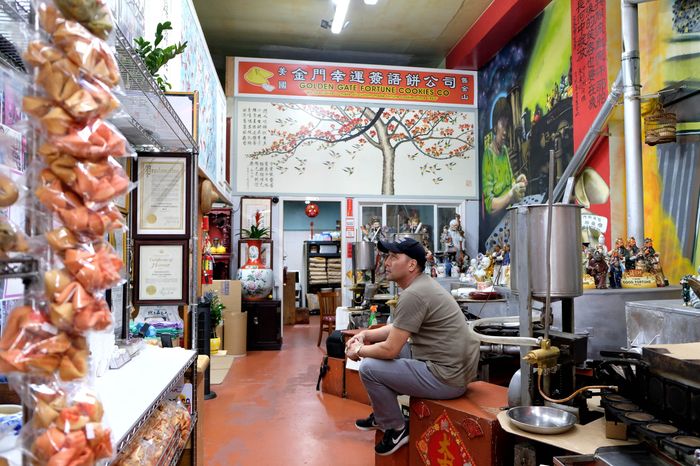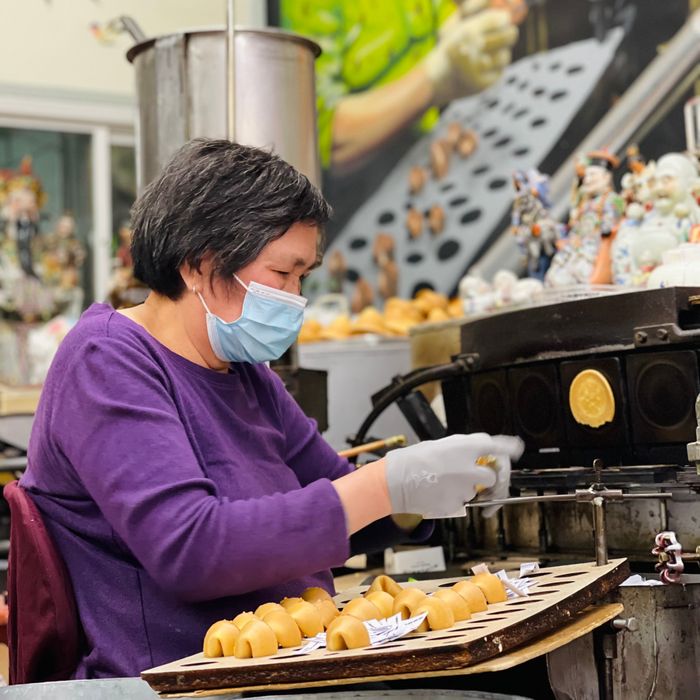Over the past two decades, Charles Li, the owner and chief executive of Chicago-based fortune-cookie factory Winfar Foods Inc., has drawn on Chinese proverbs and popular sayings to write thousands of messages that go into the wafers. Mr. Li says he and his 80-year-old father-in-law spend long hours coming up with lines that are clever but still brief enough to fit on a ribbon of paper.
Winfar now supplies fortune cookies to more than 11,000 restaurants nationwide, and Mr. Li says he has had to bring in outside copywriters. “Writing fortunes is both fun and hard work,” he says, which itself sounds like something out of a fortune cookie.
The fortune-writing industrial complex, however, is on the brink of a major upheaval. Or, as a cookie might put it: Beware—the machines are coming for your job.
OpenFortune Inc., a New York-based company that supplies printed messages to well over a dozen fortune-cookie factories around the world, says it has started using ChatGPT technology to potentially generate a near-limitless inventory of new messages.
Making up the sayings in the cookies is a vigorous line of work. By some estimates, three billion fortune cookies are made by factories around the world every year. Nearly all are written by a handful of fortune-cookie factory owners, their families or small teams of copywriters.
Big Fortune Cookie is divided over whether to embrace the new technology. Some, such as Mr. Li at Winfar, say artificial intelligence will be a big time saver and are adopting it.
Others, including Kevin Chan, say they will not be turning their prose over to software, and aren’t convinced smart technology will make a smart cookie.

Kevin Chan at the Golden Gate Fortune Cookie Factory in San Francisco. AI is coming to message writing but he’s not biting.
Photo:
Wu Xiaoling/Xinhua/Getty Images
Mr. Chan, the 53-year-old co-owner of the Golden Gate Fortune Cookie Factory in San Francisco, says computers writing cookie fortunes “is a sign that society is moving too fast.”
He began composing fortunes as a teenager to help his mother, Nancy Tom Chan, and often cribbed aphorisms from Confucius, he says. Today, the 60-year-old family business cranks out roughly 10,000 handmade fortune cookies every day, Mr. Chan says, and by his count, they have written more than 5,000 fortunes.
His favorites are the romantic ones, such as: “The love of your life is right around the corner.” The shop has even slipped marriage proposals into customized cookies by coordinating with the hopeful groom. “Fortune cookies are a form of meditation,” Mr. Chan says, “and people today need to meditate. We are humans. Computers are just computers.”
Shawn Porat, the “chief fortune officer” of six-year-old OpenFortune, says the viral chatbot’s underlying software, designed to provide human-ish responses to simple prompts, can in seconds spit out messages that are indistinguishable from those of veteran fortune-cookie writers.

OpenFortune founders, from left to right, Matt Williams and Shawn Porat
Photo:
OpenFortune
For those who might bash artificial intelligence as not yet perfected, Mr. Porat says ChatGPT’s oddball tendency to occasionally deliver cryptic responses makes the technology a perfect fit: Part of the charm of fortune cookies is the occasional message that reads like it was written by, well, a robot pretending to be a person.
“As long as it’s not offensive, we keep it,” Mr. Porat says.
After several months of fine-tuning the algorithm with hundreds of trial prompts, the messages have become more or less intelligible, OpenFortune says. Among the algorithm’s nuggets: “You will soon have a delightful encounter with a stranger who will add a pinch of spice to your life”; and, “A harmonious melody will soon drift into your world, guiding you to dance with destiny.”
The AI software also produced a few head-scratchers, such as, “Your fate is written in the stars and encrypted in the clouds…”
Fortune cookies, long a staple of Chinese restaurants in the U.S. but largely unheard of in China, likely originated in Japan centuries ago as “fortune crackers” containing tiny slips with holiday messages, according to the Museum of Food and Drink in New York.
Japanese immigrants in the 1800s are believed to have brought them to California, where years later they were picked up by Chinese restaurant owners in San Francisco looking to adapt traditional Chinese food for the American palate.
“There’s something so playful about them. It lightens your load,” says Grace Young, a Julia Child Award-winning Chinese cookbook author and culinary historian. “It’s like we need something from the universe, a little piece of good news or wisdom.”

Kevin Chan’s mother, Nancy Tom Chan, the co-owner of The Golden Gate Fortune Cookie Factory in San Francisco’s Chinatown
Photo:
The Golden Gate Fortune Cookie Factory
After a recent meal in New York’s Chinatown, Ms. Young says, her fortune read: “Courage is the hallmark of the warrior,” while her dinner companion’s noted: “Don’t worry about the world coming to end, it’s already tomorrow in Australia.”
Wonton Food Inc., one of the world’s largest fortune-cookie manufacturer, based in New York with a distribution network that supplies more than 40,000 restaurants nationwide, has written its own fortune-cookie messages since the 1970s, says Derrick Wong, Wonton Food’s vice president of sales.
The company currently has a database of some 15,000 messages, swapping in and out roughly 5,000 every year to lower the odds of a diner getting the same fortune twice, Mr. Wong says. Most of the company’s stockpile of fortunes were penned by
Donald Lau,
a banker who joined the company in the 1980s and eventually became chief financial officer. In his prime, Mr. Lau, now retired, wrote more than 100 messages every year, the company says.
“He really loved to write the fortunes,” Mr. Wong recalls about Mr. Lau, who was known to carry around history books, collections of poetry and a notebook. “When he left it was very hard to keep up,” he adds.
Yet despite the hassles, Mr. Wong still worries ChatGPT and other software tools require a long list of restrictions to avoid offensive or unhinged output. “But if we set that many boundaries, the messages would be boring,” he says.
Instead of software, Wonton Food is currently recruiting fortune-cookie writers and aims to add another 5,000 or so to its inventory of messages. Recent applicants include English literature grads and journalists. “We ask them to send in samples and we go from there,” Mr. Wong says. An in-house panel assesses applicants, based on their personality and writing style.
Mr. Porat and his co-founder, OpenFortune Chief Executive Matt Williams say the company doesn’t want to mess with tradition. Rather they want to improve a painstaking process that has changed little in more than a century.
Mr. Li, of Winfar Foods, which supplies fortune cookies to thousands of restaurants, concedes that imagination and attention to detail goes into writing messages, but he believes software is up to the task and calls it a “great idea.” Winfar already has started using OpenFortune’s cookie-writing software at its factory to produce messages.
Mr. Li still has a fondness for the many fortunes he’s written with his father-in-law, and says they still get a laugh over them, including one of his all-time favorites: “Yesterday was bad, but don’t let it ruin tomorrow…Or do, we’re not your therapists!”
Write to Angus Loten at Angus.Loten@wsj.com
Copyright ©2022 Dow Jones & Company, Inc. All Rights Reserved. 87990cbe856818d5eddac44c7b1cdeb8











